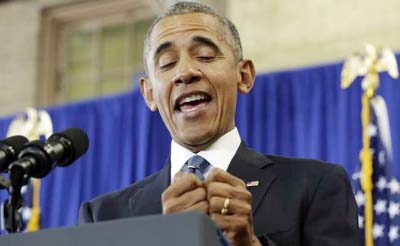
Reuters, Washington :
When President Barack Obama leaves office on Jan. 20 after eight years, several of his major initiatives will still hang in the legal balance, meaning the US courts and his successor will play a major role in shaping his legacy.
Ongoing legal challenges by Republican-governed states and business groups are targeting Obama’s signature healthcare law, his plan to combat climate change, a key immigration initiative, his transgender rights policy, his “net neutrality” internet rules, overtime pay for workers and other matters.
Most of the cases are awaiting rulings by trial judges or regional federal appeals courts and could be bound for the US Supreme Court, but are unlikely to get there until after the winner of Tuesday’s election, pitting Democrat Hillary Clinton against Republican Donald Trump, is sworn in.
Unless the US Senate changes course and confirms Obama’s nominee, appellate court judge Merrick Garland, to fill the vacant ninth seat on the ideologically split Supreme Court, the next president would be responsible for selecting a new justice who could cast the deciding vote in these cases.
The Supreme Court has already agreed to decide a major transgender rights case. Obama’s administration is backing a female-born transgender high school student named Gavin Grimm, who identifies as male and sued in 2015 to win the right to use the school’s boys’ bathroom. A ruling, which also could resolve similar litigation around the country, is not due until the end of June.
In another transgender rights case, a number of states challenged the Obama administration’s May guidance to public schools nationwide to let transgender students use bathrooms of their choice. A federal judge blocked the policy in August while the litigation continues.
Because Obama during much of his presidency has faced a Republican-controlled Congress hostile to his legislative initiatives, he has often bypassed lawmakers and used executive power to advance policy goals.
“Despite having majorities in both houses of Congress, Republicans have refused to govern. Instead, this litigious Republican Party has rushed to the courts with partisan lawsuits,” White House spokesman Eric Schultz said.
Those challenging Obama have vowed to fight on unless his successor changes course.
“Should a new administration rescind those policies and respect the bounds placed before it, we will happily direct our energies elsewhere,” added Republican Texas Attorney General Ken Paxton, who has helped spearhead various legal challenges to Obama.
Clinton, backed by Obama in her White House bid, could be expected to leave in place or even expand on his initiatives and to defend them in court. Trump, if elected, could quickly reverse Obama executive orders as promised. But undoing large-scale regulations like power plant emissions rules could be more complicated.
“It’s not at the stroke of a pen,” said Sean Donahue, a lawyer representing environmental groups that backed Obama administration climate rules known as the Clean Power Plan.
Trump would have to undergo a new, lengthy rule-making process, according to legal experts.
When President Barack Obama leaves office on Jan. 20 after eight years, several of his major initiatives will still hang in the legal balance, meaning the US courts and his successor will play a major role in shaping his legacy.
Ongoing legal challenges by Republican-governed states and business groups are targeting Obama’s signature healthcare law, his plan to combat climate change, a key immigration initiative, his transgender rights policy, his “net neutrality” internet rules, overtime pay for workers and other matters.
Most of the cases are awaiting rulings by trial judges or regional federal appeals courts and could be bound for the US Supreme Court, but are unlikely to get there until after the winner of Tuesday’s election, pitting Democrat Hillary Clinton against Republican Donald Trump, is sworn in.
Unless the US Senate changes course and confirms Obama’s nominee, appellate court judge Merrick Garland, to fill the vacant ninth seat on the ideologically split Supreme Court, the next president would be responsible for selecting a new justice who could cast the deciding vote in these cases.
The Supreme Court has already agreed to decide a major transgender rights case. Obama’s administration is backing a female-born transgender high school student named Gavin Grimm, who identifies as male and sued in 2015 to win the right to use the school’s boys’ bathroom. A ruling, which also could resolve similar litigation around the country, is not due until the end of June.
In another transgender rights case, a number of states challenged the Obama administration’s May guidance to public schools nationwide to let transgender students use bathrooms of their choice. A federal judge blocked the policy in August while the litigation continues.
Because Obama during much of his presidency has faced a Republican-controlled Congress hostile to his legislative initiatives, he has often bypassed lawmakers and used executive power to advance policy goals.
“Despite having majorities in both houses of Congress, Republicans have refused to govern. Instead, this litigious Republican Party has rushed to the courts with partisan lawsuits,” White House spokesman Eric Schultz said.
Those challenging Obama have vowed to fight on unless his successor changes course.
“Should a new administration rescind those policies and respect the bounds placed before it, we will happily direct our energies elsewhere,” added Republican Texas Attorney General Ken Paxton, who has helped spearhead various legal challenges to Obama.
Clinton, backed by Obama in her White House bid, could be expected to leave in place or even expand on his initiatives and to defend them in court. Trump, if elected, could quickly reverse Obama executive orders as promised. But undoing large-scale regulations like power plant emissions rules could be more complicated.
“It’s not at the stroke of a pen,” said Sean Donahue, a lawyer representing environmental groups that backed Obama administration climate rules known as the Clean Power Plan.
Trump would have to undergo a new, lengthy rule-making process, according to legal experts.

